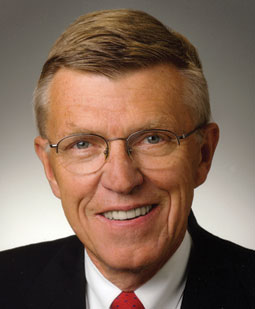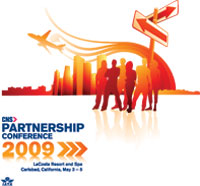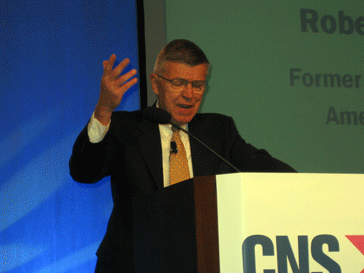Crandall
Keynotes Tough Year At CNS
  Dateline
Carlsbad—“The theme of your conference
– implementing the vision – sounds like a challenge appropriate
for the airline industry. If only it could do so,” said Robert Crandall
the former CEO of AMR. Dateline
Carlsbad—“The theme of your conference
– implementing the vision – sounds like a challenge appropriate
for the airline industry. If only it could do so,” said Robert Crandall
the former CEO of AMR.
Speaking at the CNS partnership conference
in Carlsbad California, the outspoken airline icon that built American
Airlines into a world power and one of the few USA carriers not to declare
bankruptcy outlined a vision for the future and air cargo.
“Although I have never seen a vision
statement for the industry, I assume that if there were one it would include
fewer crisis, consistent profits, better labor-management relations, more
on time flights, fewer customer complaints and less general disapprobation.
“It’s astounding how elusive
that seemingly simple set of objectives has been. I’ve been in and
around the business for almost 40 years now, and I can remember few times
when some crisis or the other wasn’t stalking the industry. Way
back in 1973, when I joined American from TWA, the then senior vice president
of operations was in the elevator lobby as I disembarked, and asked if
I knew what a mess I was getting myself into.
“And it’s been like that ever
since.
“Indeed, it’s been like that
forever in commercial aviation.
“In the years since the Wright brothers
first flew, the airlines have never been able to earn consistent returns
and have lost, cumulatively, billions of dollars.
“In the years since the industry was
deregulated, 200 odd airlines have come and gone, and most of our domestic
carriers have been in and out of bankruptcy at least once; some have made
the trip on multiple occasions.
“The consequences for the U. S. carriers,
and our economy, have been very adverse.
“I think the recession will be deeper
and longer than the optimists expect.
“The airlines will see fewer business
travelers and lower yields than they would prefer for some time to come.
"It is also likely, I think, that air
cargo volumes will remain depressed for some time to come. The precipitous
traffic declines of late 2008 and early 2009 are greater than the effect
on air cargo volumes following the tragedy of 9/11 when the aviation system
was shut down.
 |
 The
theme of CNS Partnership Conference – implementing the vision
– sounds like a challenge appropriate for the airline industry. The
theme of CNS Partnership Conference – implementing the vision
– sounds like a challenge appropriate for the airline industry.
 If
only it could do so!!! If
only it could do so!!!
|
"Even if world trade levels off in
the near term future, and manufacturing activity increases following the
substantial inventory liquidations that have characterized recent months,
air freight volumes are unlikely to leap back to earlier levels.
"As we all know, consumer products
tend to be high value and low weight and are an important component of
air freight volume.
"Unhappily, U.S. consumer spending
is unlikely to be robust in the near term, since U. S. consumers must
substantially increase their saving to pay down debt and build nest eggs
for the future.
"In the context of this discouraging
outlook, I think it is very important that the industry do all it can
to optimize its performance and eliminate unnecessary costs.
"One of the most daunting challenges
to achieving that objective is the pending impact of 100% screening of
all cargo on passenger aircraft, scheduled for implementation only 15
months from now.
"While some believe that the many obstacles
to accomplishing the goal make deferral likely, I do not think that counting
on it is a sound business plan, since it would take only a single event
to make deferral politically impossible.
"Thus it seems to me that everyone
in the cargo supply chain ought to be working hard to achieve compliance.
“As I am sure you know, only about
300 cargo screening sites have been certified by TSA under its CCSP program,
which means that lots of shippers and forwarders are not yet on board.
“Given the prohibitive cost of unpacking
containers and pallets for individualized inspection at airports, and
the lengthy delays such screening would inevitably cause, it seems to
me that the industry should be working this problem more aggressively
than it is.
“In addition to becoming certified,
forwarders should be pushing their important customers to achieve certification
as well. Shippers, forwarders and airlines should also be pushing the
TSA to certify one or more of the container and pallet screening systems
now coming into use abroad.
“Finally, all hands should be collaborating
to create on airport cargo screening facilities with optimized work flows
and the best available support systems.
It’s also time, it seems to me, to
get serious about the paper problem.
 “Way
back in the 90’s, before I retired, we were working hard on ways
to reduce the imposing paperwork burden with which air freight has long
contended. “Way
back in the 90’s, before I retired, we were working hard on ways
to reduce the imposing paperwork burden with which air freight has long
contended.
“It always seemed to me – and
must still seem to you – that the volume of paper is entirely disproportionate
to either the value or the volume of the cargo itself.
“Yet despite the lapse of more than
a decade, it seems that only modest progress has been made. “IATA’s
e freight initiative can manage only 12 of the roughly 30 documents required
for each air freight shipment, and is functional at only 26 airports worldwide.
In the United States, only two airports – New York and Chicago –
are current participants and the United States has no cohesive electronic
system for managing the information associated with air freight exports.
“In a world which has digitized virtually
everything that has ever been learned, and is able to transmit and receive
almost anything to virtually any location on the planet, it is absurd
for the airlines and their customers to be filling in forms and entrusting
tote bags of documents to messengers who stand in line to tell bureaucrats
what’s arriving and leaving by air. In this area, as with security,
the industry needs to be lots more aggressive. Air commerce is hugely
important to almost every country, and the shippers, forwarders and airlines
who make it happen have the clout needed to move the ball forward.
“Since I’m no longer in the
fray day to day, I don’t know why progress has lagged so badly –
but I’m sure that whatever the obstacles, you should be pushing
the world customs organization to get on with the task of standardizing
the form and content of all the data fields and all the documents associated
with moving goods from place to place.
“The industry needs to recognize that
in hard times, customers will be even more anxious than normal to assure
themselves that what they ship will be flown and delivered as promised.
And airlines and forwarders alike need to understand that outstanding
service is the best guarantee of continuing success.”
Geoffrey/Sabiha Arend |
